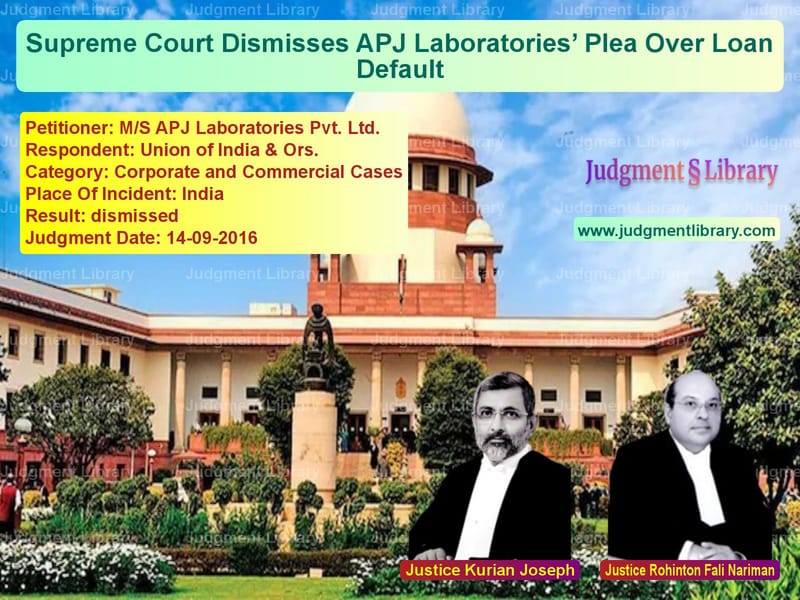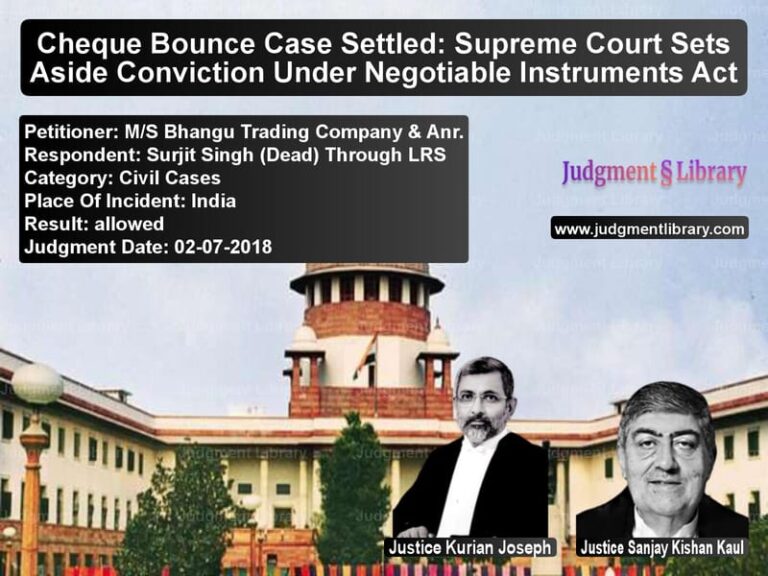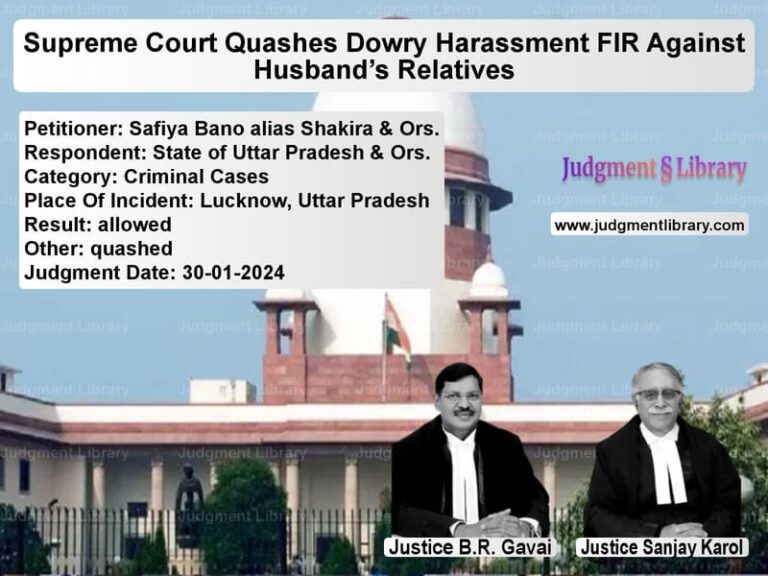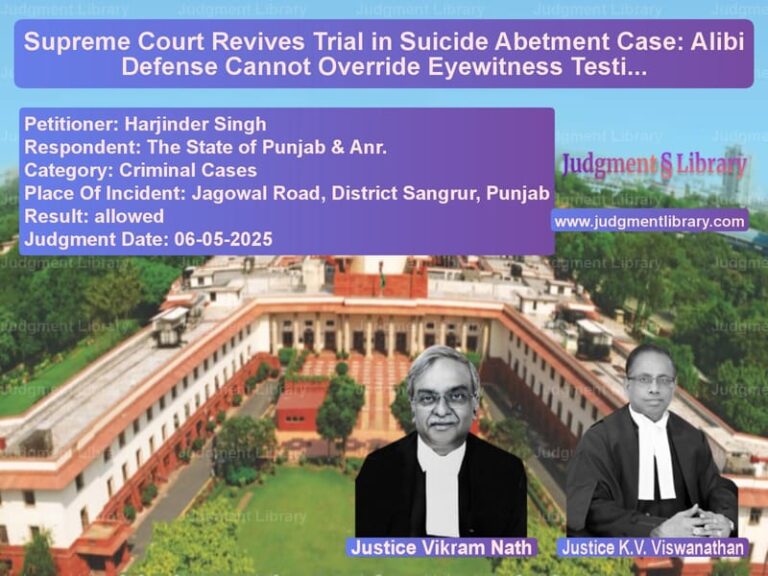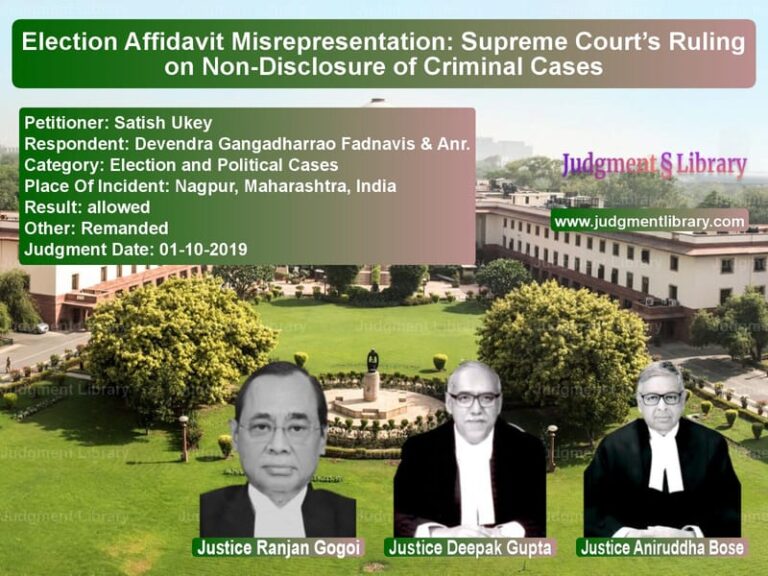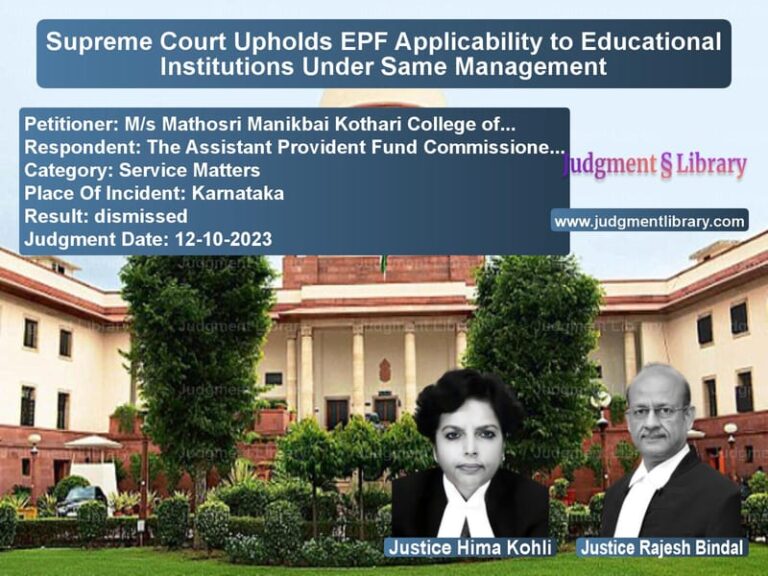Supreme Court Dismisses APJ Laboratories’ Plea Over Loan Default
The case of M/S APJ Laboratories Pvt. Ltd. v. Union of India & Ors. revolves around the issue of loan recovery and the failure of the petitioner to meet the court-mandated conditions for relief. The Supreme Court dismissed the writ petition after the petitioner failed to comply with the conditions imposed by the Court in its interim order. However, the Court clarified that the petitioner could still explore a one-time settlement with the bank.
Background of the Case
APJ Laboratories Pvt. Ltd. approached the Supreme Court with a writ petition challenging the auction of its property for loan recovery. The petitioner sought relief from the Court to prevent the auction proceedings and sought time to clear its outstanding dues.
On 29.07.2016, the Supreme Court issued an interim order staying the auction proceedings on the condition that the petitioner deposit 75% of the outstanding dues as of 31.03.2016 in two installments:
- The first installment (50% of the dues) was to be paid within six weeks from the date of the order.
- The second installment (25% of the dues) was to be paid within another six weeks.
The Court also explicitly stated that failure to remit the first installment within six weeks would result in the automatic dismissal of the writ petition.
Key Legal Issues
- Could APJ Laboratories Pvt. Ltd. seek relief from loan recovery proceedings through a writ petition?
- What was the legal consequence of non-compliance with the Supreme Court’s interim order?
- Could the petitioner still explore a one-time settlement with the bank?
Arguments from the Petitioner (APJ Laboratories Pvt. Ltd.)
- The petitioner argued that the auction of its property was unfair and that it needed additional time to arrange the required payments.
- It requested the Court to extend the deadline for compliance with the interim order.
- The petitioner sought protection from the auction proceedings until a final settlement could be reached.
Arguments from the Respondents (Union of India & Others)
- The respondents maintained that the loan recovery process was lawful and that the petitioner had been given ample time to settle its dues.
- They argued that the petitioner had failed to comply with the Supreme Court’s conditions and thus had no further claim for relief.
- The respondents contended that the auction proceedings should not be stalled indefinitely due to the petitioner’s inaction.
Supreme Court’s Judgment
1. Non-Compliance with Interim Order
The Supreme Court noted that the petitioner had failed to deposit the required first installment within the stipulated six-week period. As per the terms of its own order, the writ petition was automatically dismissed.
2. Legal Consequences of Dismissal
The Court ruled that the petitioner could not seek further relief from the Supreme Court since it had not complied with the conditions set for continuing the case. The judgment stated:
“In terms of the said order, the writ petition is dismissed.”
3. Possibility of One-Time Settlement
Despite dismissing the petition, the Supreme Court clarified that APJ Laboratories Pvt. Ltd. was not barred from negotiating a one-time settlement with the bank. The judgment included the following clarification:
“However, we make it clear that dismissal of the writ petition shall not stand in the way of the petitioner availing one-time settlement, if available, with the bank.”
Key Takeaways from the Judgment
- The Supreme Court enforces strict compliance with interim relief conditions.
- Failure to meet court-ordered payment deadlines can result in automatic dismissal of a case.
- Even after dismissal, borrowers may explore settlement options with lenders.
- Loan recovery disputes must be approached with prompt compliance with legal conditions.
Conclusion
The Supreme Court’s ruling in M/S APJ Laboratories Pvt. Ltd. v. Union of India & Ors. highlights the importance of complying with court-ordered conditions when seeking relief. The dismissal of the petition due to non-compliance underscores the legal principle that parties must adhere to interim relief conditions to maintain their claims. However, the Court’s acknowledgment of a possible one-time settlement ensures that the petitioner still has an opportunity to negotiate with the bank.
Don’t miss out on the full details! Download the complete judgment in PDF format below and gain valuable insights instantly!
Download Judgment: MS APJ Laboratories vs Union of India & Ors Supreme Court of India Judgment Dated 14-09-2016-1741883747955.pdf
Direct Downlaod Judgment: Direct downlaod this Judgment
See all petitions in Bankruptcy and Insolvency
See all petitions in Debt Recovery
See all petitions in Corporate Compliance
See all petitions in Judgment by Kurian Joseph
See all petitions in Judgment by Rohinton Fali Nariman
See all petitions in dismissed
See all petitions in supreme court of India judgments September 2016
See all petitions in 2016 judgments
See all posts in Corporate and Commercial Cases Category
See all allowed petitions in Corporate and Commercial Cases Category
See all Dismissed petitions in Corporate and Commercial Cases Category
See all partially allowed petitions in Corporate and Commercial Cases Category

